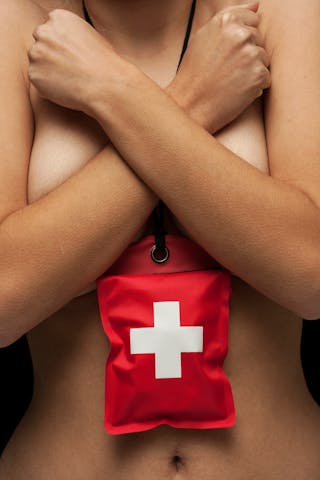Creating An Asexual Character For TV Showed Me We Have A Way To Go
There's been a lot of buzz lately about the representation of asexual characters on TV, and it's no surprise that the progress has been slow. While we've seen some positive strides in shows like "BoJack Horseman" and "Brooklyn Nine-Nine," there are still major obstacles in the way. Many shows continue to overlook asexual identities or misrepresent them entirely. It's important for viewers to keep pushing for accurate and thoughtful portrayals of asexuality in the media. For more information on this topic, check out this insightful article that delves into the complexities of asexual representation on TV.
When it comes to representation on television, the LGBTQ+ community has made great strides in recent years. We've seen more diverse and inclusive characters than ever before, but one group that still seems to be underrepresented is the asexual community. As someone who identifies as asexual, I was excited to hear that a major TV show was introducing an asexual character. However, upon watching the portrayal, it became clear that we still have a long way to go in terms of accurate and respectful representation.
If you're a nerd or geek looking for love, you should definitely try out this dating app for nerds and geeks at SexyLinx.
The Importance of Asexual Representation
Explore the kink scene in El Paso and find your perfect hookup for an exciting and adventurous dating experience.
Asexuality is a sexual orientation characterized by a lack of sexual attraction to others. It's a valid and legitimate identity, but it's often misunderstood or overlooked in mainstream media. For many asexual individuals, seeing themselves represented on TV can be incredibly validating and empowering. It can help to combat the erasure and stigma that asexual people often face in society.
Check out this comprehensive review of HornyWife, a sexy hookup site!
When a well-known TV show announced that they would be introducing an asexual character, I was hopeful that this would be a step in the right direction. However, as I watched the portrayal unfold, I couldn't help but feel disappointed by the missed opportunities and stereotypes that were perpetuated.
The Problem with Stereotypes
One of the biggest issues with the portrayal of asexual characters on TV is the reliance on stereotypes. In the case of the character in question, they were portrayed as cold, emotionless, and robotic. This is a harmful stereotype that paints asexual individuals as being incapable of experiencing or expressing emotion, which couldn't be further from the truth.
Asexuality is a spectrum, and asexual individuals are just as capable of forming deep and meaningful connections with others as anyone else. By perpetuating these stereotypes, TV shows are doing a disservice to the asexual community and reinforcing harmful misconceptions.
Missed Opportunities for Education
Another issue with the portrayal of asexual characters on TV is the missed opportunities for education. When done well, the introduction of an asexual character can be a chance to educate the audience about asexuality and debunk common myths and misconceptions.
Unfortunately, the portrayal of the asexual character in this particular TV show missed the mark in this regard. There was no exploration of the character's asexuality or the challenges they may face, and as a result, the audience was left with a shallow and one-dimensional understanding of what it means to be asexual.
Moving Forward
While the portrayal of asexual characters on TV may leave much to be desired, there is hope for the future. As discussions around diversity and representation continue to gain momentum, there is a growing awareness of the need for accurate and respectful portrayals of asexual individuals.
It's important for TV writers and creators to do their research and consult with asexual individuals when developing asexual characters. By taking the time to understand and accurately represent asexuality, TV shows can help to combat stigma and promote greater understanding and acceptance.
As a member of the asexual community, I remain hopeful that we will see more nuanced and authentic portrayals of asexual characters on TV in the future. In the meantime, it's crucial for asexual individuals to continue speaking out and advocating for better representation. By raising our voices and sharing our stories, we can work towards a future where asexuality is acknowledged and respected in all forms of media.
- https://dating.timebombrecordings.com/posts/would-you-try-a-sex-fast-like-kourtney/
- https://dating-services.getweps.com/posts/phone-sex-operator-men-masturbate-to-my-voice-eight-hours-a-day/
- https://online-sex.thehottieandthenottie.com/posts/students-are-turning-to-porn-for-their-sex-education/
- https://sex-guide.timebombrecordings.com/posts/butter-churner-sex-position-love-islands-callums-favourite-sex-position/
- https://online-dating.thehottieandthenottie.com/posts/would-you-try-rickys-sex-toy-easter-egg/
- https://online-hookup.thehottieandthenottie.com/posts/how-often-do-women-orgasm-during-sex/
- https://hookupguide.thehottieandthenottie.com/posts/dating-app-tips-when-to-meet-a-dating-app-match/
- https://flirting.ua-sex.com/posts/my-best-sex-ever-was-with-my-housemate/
- https://matchmaker.themountaintopplay.com/posts/my-best-sex-ever-was-my-first-time-with-a-woman/
- https://sexting.themountaintopplay.com/posts/dating-burnout-how-to-cope-with-dating-burnout/
- https://dating-blog.getweps.com/posts/lily-allen-sex-toy-lily-allen-womanizer-liberty-clit-sucker/
- https://dating-app.timebombrecordings.com/posts/my-best-sex-ever-was-when-i-dominated-him/
- https://singles.getweps.com/posts/threesome-positions-6-best-threesome-sex-positions/
- https://location-dating.ua-sex.com/posts/making-a-good-impression-meeting-the-parents/
